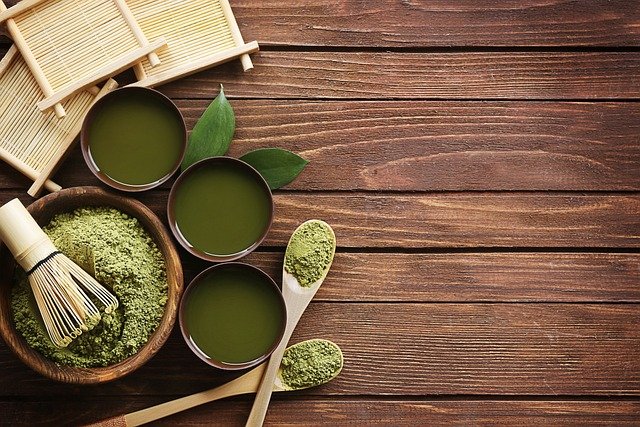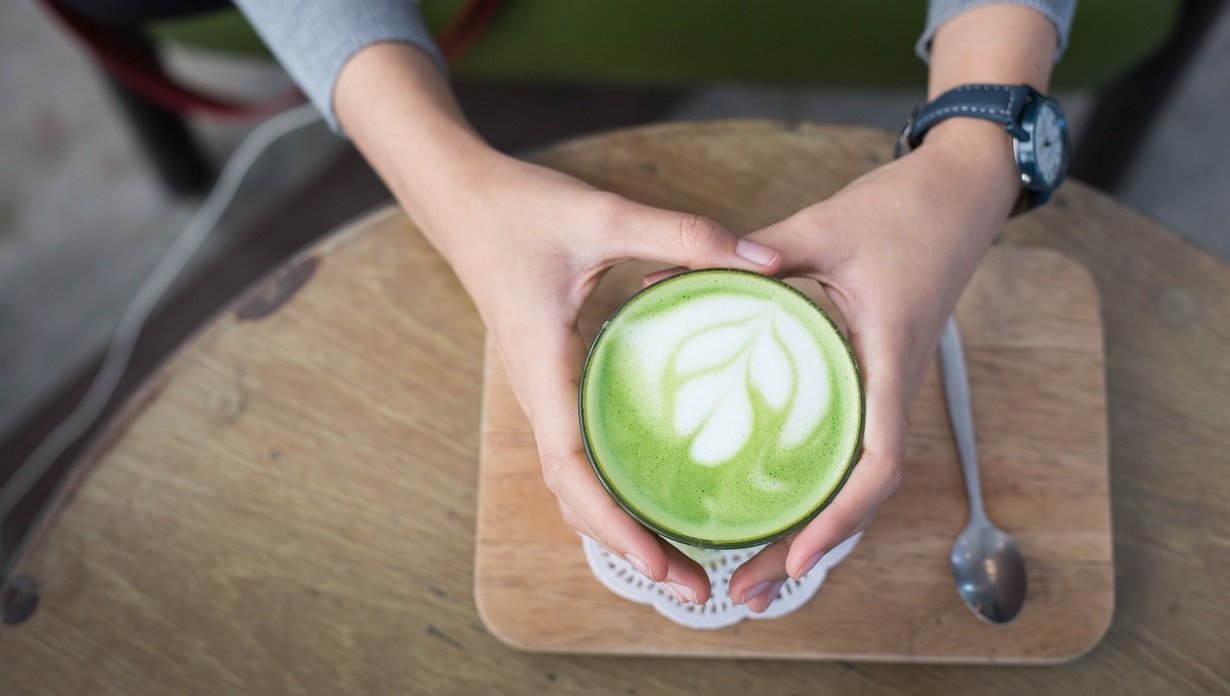Imagine starting your day with a big cup of vibrant green tea. It literally not only wakes you up but pumps good things through [your] body. That’s how Matcha green tea works—it’s a powdered green tea made from select green tea leaves. Unlike regular green tea, we eat the whole leaf with Matcha, where you steep the leaves and discard them. This equates to greater antioxidants, nutrients, and taste.
Matcha has been present in Japanese culture for decades. It was used in tea parties to keep people calm and clear-headed. Now, it grows everywhere and appears in lattes, smoothies, sweets, and more for the skin. Most people not only enjoy its deep, rich flavor but also adore it for the incredible health benefits it offers.
Packed with goodies like EGCG, L-theanine, and chlorophyll, Matcha has become that brain-boosting, heart-pumping, food-burning, detoxicating, skin-glowing miracle we all need. It provides a smooth, placid bit of energy without the jitters that coffee gives you—perfect for a soft lift for those who need one.
In this article, we are going to explore the Benefits of Matcha green tea for your health and show you why this ancient superfood is not just some fad — it’s a true pillar of your wellness. It’s widespread in lattes, teas, on-the-go drinks , and even desserts. But what, exactly, is Matcha, and how is it different from the green tea we know and love?
Similar to the green tea we are familiar with, Matcha Stores from the Camellia Sinensis Plant.
What is Matcha?

Matcha has grown to be well-loved in health stores and coffee shops. You can find it in many things—lattes, teas, quick drinks, and even sweets. But what is Matcha, really, and how is it different from the green tea we usually see?
Like the green tea we know, Matcha starts from the Camellia Sinensis plant. But, it has a special way it grows that makes it better in how good it is for you. Farmers keep Matcha green tea plants in the dark for a few weeks before they pick them. This adds more green color and makes them have more amino acids.
After picking the leaves, they remove the stems and veins and crush them into a bright, fine green powder. Unlike normal green tea, which requires you to soak the leaves and then throw them away, Matcha requires you to drink the full leaf. This means it contains more caffeine, antioxidants, and other key nutrients.
Health Benefits of Matcha Green Tea
Here are the top 10 Health Benefits of Matcha Tea:

1. Rich in Antioxidants
Matcha is loaded with catechins, a type of small plant part found in tea that works as a natural guard and plays a huge part in beating destructive free radicals. These can harm cells and lead to big sickness like heart problems and cancer.
As Matcha grows in the shade, it has different catechins from those in regular green tea. Even though the growing part reduces catechins in the leaves, having Matcha as a powder mixed in water gives you three times more antioxidants than the green tea you steep. This makes it a top source of bits that fight free radicals.
In a test, mice that had Matcha showed less cell stress and more antioxidant activity, which suggests that it may protect cells from damage. Add Matcha to your days to up your antioxidant intake, helping guard your body against age, swelling, and many lasting illnesses.
As tea, latte, or smoothie, Matcha is a good, yummy way to fill your body with tough protectors.
2. Supports Liver Health
The liver is essential for us. It works to clean out toxins, break down drugs, and sort out what we eat and drink. It’s vital to keep it in good shape, and Matcha might help shield it.
Studies show that green tea, including Matcha, might reduce the chance of liver illness. A 2015 look at 15 studies found that those who drink green tea often might be less likely to get liver issues. Also, some reports claim that Matcha could aid folks with a type of liver issue called nonalcoholic fatty liver disease (NAFLD) by lowering liver enzyme counts, which show liver stress.
But there is proof that in people without NAFLD, Matcha might raise liver enzyme levels slightly. This shows that its effects can change based on a person’s health.
Most work so far has used green tea extract and looked at animals. More research is needed on how Matcha affects all people. Still, if used in small amounts, Matcha seems like a good natural help for liver function and cleaning out toxins.
3. Enhances Brain Function
Matcha is not only good for your body, but it also makes your mind sharp. Many tests show that the mix of things in Matcha, like caffeine and L-theanine, can make your brain Function better.
In one test, 23 people did some brain tasks after they had Matcha green tea, a Matcha snack, or a fake snack. Those who had Matcha did much better in focus, quick answers, and memory than the ones who had the phony snack. A study on older folk found that taking 2g of green tea powder daily for two months improved their brain function.
4. Might Fight Cancer
Matcha has strong parts that have been looked at for their help in halting cancer. One key antioxidant found in Matcha is epigallocatechin-3-gallate (EGCG), a type of help thought to fight cancer.
Early work in labs and on animals shows that EGCG could stop some cancer cells from growing. These signs are good, but we need more tests on people to know how well Matcha can fight cancer.
Even though tests are still ongoing, Matcha’s high level of helpers may help keep cells safe and prevent disease, making it a good food to add to a healthy eating plan.
5. Boosts the Immune System
Matcha is packed with immune-boosting nutrients that help your body stay strong. It brings you vitamins A, C, and E, which are top in making your body’s defense strong, reducing swelling, and keeping you well all around. Vitamin C can help you to make more white blood cells, which fight off the nasty bugs, while vitamin A keeps the body’s first defense line strong against harm. Vitamin E works like a shield, protecting the immune cells from damage.
Apart from vitamins, Matcha has loads of catechins, strong plant bits that kill germs and fight viruses. These help beat terrible bacteria and viruses, reducing the chance of getting sick. Studies show that catechins in Matcha might even stop some viruses by preventing them from sticking to healthy cells.
Drinking Matcha green tea regularly can help strengthen your body against colds, flu, and other illnesses. You can have it as tea, latte, or smoothie. Adding Matcha to your day is an easy and good-tasting way to boost your immune health.
6. Supports Heart Health
Some studies show that green tea, which has much in common with Matcha, might reduce the risk of heart disease. Reports tie drinking green tea to lower blood pressure and better heart health, making it good for the heart.
Matcha, which contains antioxidants and beneficial compounds, may help the heart in the same ways. Yet, some animal tests do not all agree, showing that more study is needed.
While its full effect on heart health is still unknown, putting Matcha in your food plan may help keep blood pressure and cholesterol at good levels and help your heart work well.
7. Regulates Blood Sugar Levels

Matcha may help keep blood sugar steady and aid in overall body health. As it’s full of good stuff like antioxidants and catechins, it might make the body better at using insulin. This can help the body handle sugar well and may reduce blood sugar.
This makes Matcha a good drink for those who want to prevent type 2 diabetes, a state often linked to improper insulin use and high blood sugar. Studies on green tea show it might cut the risk of diabetes. Since Matcha is a strong type of green tea, it might even help more.
Unlike sugary drinks such as sodas and sweet coffee, which make blood sugar levels go up and down fast, Matcha gives a smooth energy flow with not too much sugar. Drinking Matcha green tea or lattes with no sugar can be a better pick for keeping sugar levels even and lowering the chance of health issues linked to sugar.
8. Helps in Losing Weight
Green tea is well known for its help in losing weight and is often a key part of fat-burning supplements. Studies show that when paired with good food and steady workouts, drinking up to 500 mg of green tea daily for 12 weeks can lower your body mass index (BMI).
While many tests look at green tea, Matcha comes from the same plant and it has similar helpful parts. With a lot of antioxidants and catechins, Matcha might help your metabolism and fat burning, which makes it a good choice to add to a weight loss plan.
9. Promotes Healthy Skin and Anti-Aging Benefits
Matcha is full of things that stop aging, like catechins and a big one called EGCG. These help fight off free radicals—bad bits that make you age too fast and harm your skin. By cutting down on these bad bits, Matcha keeps you looking young and can slow signs of getting old.
More than just anti-aging, Matcha’s powder to reduce swelling can help with acne and sore skin. EGCG can help keep your skin oil-free, reducing pimples and clogs. It also kills harmful bacteria, helping to clear away acne and make your skin look better.
A significant benefit of Matcha is its power to protect skin from UV damage. Studies show that the stuff in Matcha, like polyphenols and antioxidants, might reduce sun harm, such as dark spots and loss of collagen. Although it can’t replace sunscreen, adding Matcha to your daily skincare might help your skin fend off outside dangers.
Using Matcha often in tea or skin care products can nurture and guard your skin from within. This makes it a top natural choice for any beauty routine.
10. Reduces Stress and Promotes Relaxation

Matcha calms you down. It has a lot of L-theanine, which helps you feel calm without feeling sleepy. It’s not like caffeine, which can sometimes make you feel jittery. L-theanine helps by upping calm brain waves. This lets you stay relaxed but still full of energy. So, Matcha is a good pick over coffee.
L-theanine also keeps cortisol, your body’s main stress hormone, in check. This can reduce worry and tight feelings. By keeping things like dopamine and serotonin in balance, it helps you feel stable and good.
Many say Matcha’s help is like what you get from sitting still and being mindful. Just like how slow breaths and being mindful keep you stable, a cup of Matcha gives you a peaceful break in your day. Drink it slowly in the morning or before a big stressful moment. Matcha is a simple yet strong way to cut stress, get sharp, and clear your mind.
Matcha Green Tea is Easy to Make

Making matcha tea is easy and takes only a few steps. First, put 1–2 teaspoons (2–4 grams) of matcha into a bowl or cup to get rid of any lumps. This ensures the tea is smooth and creamy. Then, warm up 2 ounces (59 ml) of water to about 175°F (80°C), but don’t let it boil, as that can make the tea taste bitter.
Pour the warm water on the matcha and stir with a bamboo whisk (chasen). Stir fast in a W or M shape until the tea is frothy and well mixed. If you like your tea mild, use 1/2 teaspoon of matcha with 3–4 ounces of water. If you want it strong, use 2 teaspoons of matcha powder with just 1 ounce of water.
Once mixed, matcha can be drunk as it is or made to suit your taste. Some add milk or sugar to make a smooth latte, while others mix matcha into shakes or treats for extra taste and good health. No matter how you make it, matcha is a tasty and lively drink that goes well with your day-to-day plans.
If you want to be more creative, you might:
- Mix matcha with turmeric for a bright, spiced tea or latte
- Stir it into milk drinks like lattes or even sweets like rice pudding
- Use it in desserts like matcha ice cream or cookies
For an extra kick of nutrients, add matcha to your protein smoothies to boost the taste and health perks.

Side Effects and Risks
Matcha has many good points for your health, but it’s best to consume it sparingly to dodge bad effects.
Matcha has more stuff that wakes you up than usual, such as green tea. While it can make you feel awake and sharp, too much might make your heart beat fast, make you restless, or mess with your sleep. If you’re not good with this wake-up stuff, try to have less Matcha.
Also, some studies show that some of the good bits in Matcha, called catechins, might harm liver function. But this worry is small if you take Matcha in normal food or drink amounts.
One more thing to think about is stuff like bug killers, bad chemicals, or arsenic in the dirt where they grow the tea. To reduce this worry, pick Matcha that is checked to be all-natural and from known-good places.
Research shows that taking up to 338 mg of catechins daily— like 4 grams (2 teaspoons) of Matcha powder—is safe for most grown-ups. But how much you can handle might be different, so it’s smart to pay attention to your body and not have too much Matcha.
Why Matcha Deserve a Place in Your Daily Routine
Matcha is not just a trendy superfood—it’s full of nutrition. It fights aging, helps your body burn food for fuel, and calms your mind. It can also make your brain and heart work better, help keep your weight down, and make your skin look good. This vibrant green tea can change how healthy you feel.
But there’s a thing to watch out for – quality and moderation matter. Pick good, clean Matcha. Drink it in a smart way to enjoy its good parts without bad things.
So, why are you waiting for? Add Matcha to your day – drink it, mix it, or cook with it – and see what this old tea can do for you!









